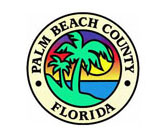The Palm Beach County Commission on Tuesday approved the preliminary reading of an ordinance to ask voters to approve a temporary 1-cent increase in the sales tax to 7 cents, with the county sharing the additional revenue with the School District of Palm Beach County and municipal governments.
In doing so, the commissioners eliminated the more controversial part of the proposal to share the revenue with economic development and cultural organizations.
Commissioner Melissa McKinlay made the motion, concerned that voters would reject the referendum if cultural organizations and business development were included. The motion for the referendum, primarily intended for infrastructure improvements, carried 5-2 with Vice Mayor Hal Valeche and Commissioner Shelley Vana opposed.
The referendum, if given final approval, will be placed on the Nov. 8 ballot.
County Administrator Verdenia Baker noted that both the county and the school district face significant infrastructure challenges.
“We must address these issues,” Baker said, explaining that the added tax would apply to all transactions except for food, baby food, medical expenses and some agricultural products, subject to state approval.
Only the first $5,000 of large items would be taxed at the higher rate. Proceeds from the local tax would go to the state, which takes an administrative fee off the top.
Baker estimated that tourists would contribute 25 percent of the revenue, which will go to improvements including school buildings, equipment, roads, bridges, water and wastewater improvements, and vehicles.
The split would be 50 percent for the school district, 30 percent for the county and 20 percent divided among the 38 municipalities.
The surtax revenue is estimated at a total of $2.7 billion over its 10-year life, which would sunset in 2026.
Baker said a sales-tax boost was originally discussed in 2013 in partnership with the school district, but it did not materialize. The idea was readdressed in 2015, with funding options including ad valorem taxes, bonds and the surtax, and the commission directed its staff to move forward with a surtax plan.
County staff came back with a list of projects, along with proposed partnerships that included the school district, the Palm Beach County League of Cities, the Cultural Council of Palm Beach County and the Business Development Board, with 48 percent to go to the school district, 27.5 percent to the county, 18.5 percent to the municipalities, 4.5 percent for economic development through cultural facilities, and 1.5 percent for economic development incentives.
The revenue would be administered through an oversight committee comprised of representatives from the county, the school district and the municipalities.
Baker said that the school board and 20 municipal governments had adopted the agreement, although they would have to reapprove the agreement with the cultural and economic development incentives removed.
The state statute authorizing the sales tax requires 50 percent plus one approval by the municipalities.
Commissioner Steve Abrams asked what would happen if the anticipated revenue is collected before 2026, and Baker said it would sunset when the amount is collected, and would end in 2026 regardless of whether the anticipated amount was collected.
Commissioner Priscilla Taylor was concerned that the extra tax appeared to fall heavier on the backs of some people who appear to be excluded from the benefits.
Vana was concerned that some small businesses would not have the resources to comply with the rigorous requirements to collect the tax.
Commissioner Paulette Burdick wanted economic incentives to include poor areas such as the Glades, whose population needs more skilled and blue-collar jobs.
Valeche, who has opposed the surtax, asked about excluding the cultural council, explaining that he did not understand its inclusion in a tax that is supposed to go for infrastructure improvements.
Taylor said that 75 percent of jobs are created by small businesses and did not want to see them excluded. “Small businesses cannot apply, yet they are paying the tax,” she said.
McKinlay said their original proposal was for the referendum to be only for infrastructure improvements. Abrams agreed that with questions being raised about the economic and cultural development portion, it would be more logical to move forward with only the infrastructure components.
“Infrastructure was the driving force of the whole effort,” Abrams said, adding that it was difficult for him to remove the economic and cultural incentives because his district would benefit greatly from them. “Economic and cultural development won’t be any worse off if it fails. To me, it is a drag on the ballot question to include economic and cultural development.”








